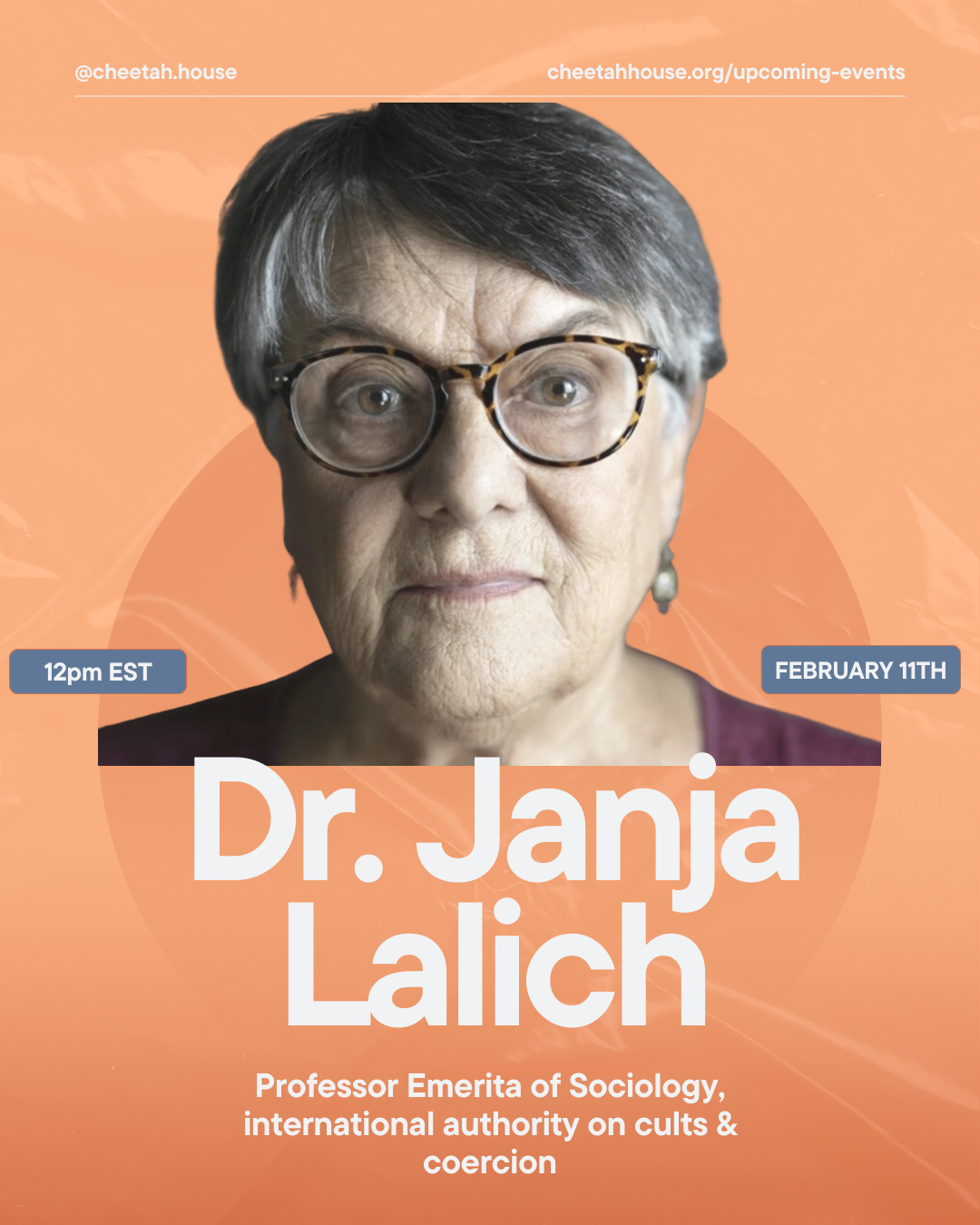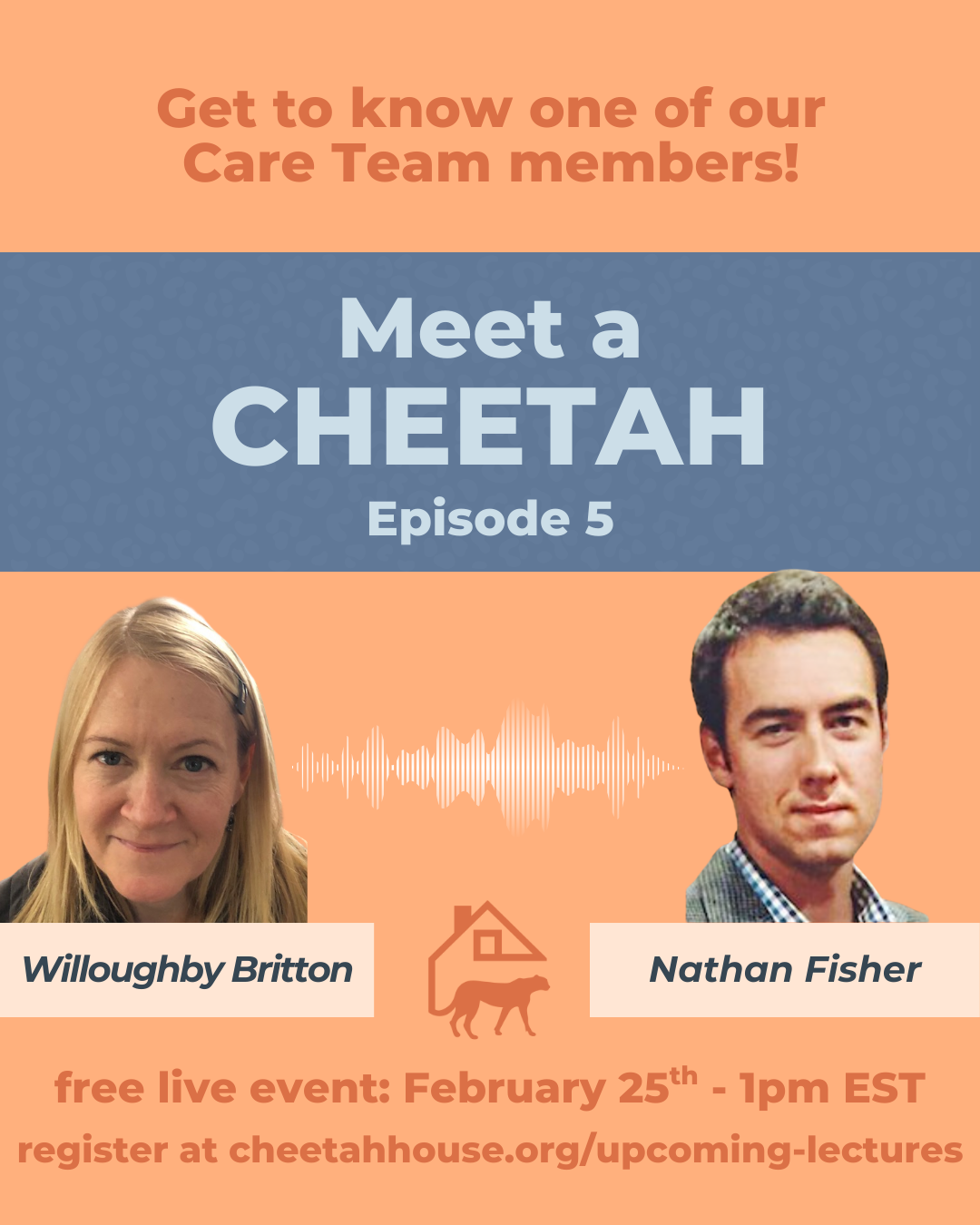
Lectures & Events
Wednesday, February 11th — 12pm EST
Coercion and Control: Who Is Responsible and Why?
Abstract: The concept of bounded choice, developed by Dr. Janja Lalich, answers this question: why do members of cults and other high-control groups behave and act in ways that seem incomprehensible to outsiders? The bounded choice framework identifies the key components of coercive groups (or relationships) that create a self-sealing (or closed) system in which members are controlled and influenced such that they undergo a change of self. Ultimately, most fully adopt a new binding worldview, typically based on an extreme ideology. The four features of the self-sealing system are charismatic authority, a transcendent belief system, systems of control, and systems of influence. They are intertwined, working together to coercively influence members to abide by total obedience and extreme loyalty. Given this, what is the extent of the irresponsibility? And how can we -- or should we -- hold them accountable?
Learning Objectives: Coming soon
Learn more at:
Use code EBLALICH by 1/28 for 60% off registration!
Dr. Janja Lalich is a globally recognized expert on cults, coercive control, and high-demand groups. A Professor Emerita of Sociology at California State University, Chico, she has spent over 35 years researching the social psychology of exploitative relationships, recruitment tactics, and systems of influence and indoctrination.
Dr. Lalich is the author or coauthor of six books, including the widely respected Take Back Your Life: Recovering from Cults and Abusive Relationships and Escaping Utopia: Growing Up in a Cult, Getting Out, and Starting Over. Her work has helped thousands of survivors, families, and professionals better understand the dynamics of cultic systems and emotional manipulation.
She founded the Center for Research on Influence and Control and has been featured in numerous documentaries, national media outlets, and podcasts. Dr. Lalich also brings firsthand insight, having herself been involved in a political cult in the 1970s and 80s — an experience that informs her deep commitment to education, recovery, and advocacy.
Her most recent work includes a newly updated third edition of Take Back Your Life (2023), continuing her mission to support survivors and raise awareness about coercive environments.
Cheetah House is approved by the American Psychological Association to sponsor continuing education for psychologists. Cheetah House maintains responsibility for this program and its content.
Meet a Cheetah: Nathan Fisher
Wednesday, February 25th — 1pm EST
Q&A between Dr. Willoughby Britton and Nathan Fisher to learn more about Nathan’s personal journey through contemplative practices, adverse effects, and his experiences as a Cheetah House Care Team member.
Dr. Fisher recently received his Ph.D. in Religious Studies and Cognitive Science from the University of California, Santa Barbara. He graduated from Vanderbilt University in 2011 before joining the Clinical and Affective Neuroscience Laboratory at Brown University where he managed the 'Varieties of Contemplative Experience' (VCE) study from 2012-2015. Before starting graduate school, he was a visiting scholar at the Mind and Life Institute—where he organized a small conference on Abrahamic contemplative traditions—and lived in Jerusalem for 2 years to explore some of the living traditions of Jewish mysticism and meditation.
At Brown, Nathan began a replication study of the VCE project investigating meditation-related difficulties in Jewish, Christian, and Islamic contemplative traditions, and has continued this research project into his PhD program. The first paper based on the study, "Dark Nights of the Soul in Abrahamic Meditative Traditions," was published in 2019 and the second was published in 2022, “Flavors of Ecstasy: States of Absorption in Islamic and Jewish Contemplative Traditions.” Both papers focus on traditional appraisal processes related to challenging experiences, whereas in his dissertation he presents phenomenological data from the study and proposes a person-centered cultural psychological framework that can be used by clinicians and teachers to provide better care for those suffering from these experiences. His other research interests include: Jewish and Comparative Mysticism, Differential Diagnosis at the intersection of Spirituality and Clinical Practice, and the emerging interdisciplinary field of Contemplative Science.
Nathan’s own journey includes contemplative practice in Jewish, Theravada, Christian, and Chinese Internal Martial Arts communities—and experiencing tangible benefits and distressing challenges in all of them. After taking a sabbatical from contemplative practice and study, he is excited to be exploring safe and ‘sifted’ approaches to re-engaging with what he has found to be nourishing and resourcing within these traditions.
POSTPONED
The Neuroscience of the Mind-Body Relationship in the Aftermath of Trauma: Implications for Treatment
Abstract: Trauma can significantly disrupt the connection between the mind, brain, and body, often leaving enduring effects on both the emotional/cognitive and somatic aspects of the self. Emerging findings in neuroscience are deepening our understanding of how somatic sensory processing—a core function that determines how the body experiences itself in space—plays a vital role in self-regulation and how we engage with the world around us.
In the wake of trauma, these systems are often severely compromised. Individuals may become disconnected from their bodies, feel a loss of agency, and struggle with a diminished sense of purpose. These disruptions can result in a fragmented sense of self and difficulty in daily functioning.
This workshop presents a comprehensive, neuroscience-informed approach to healing the traumatized self. Through integrative strategies, participants will learn how to rebuild the mind-body connection—whether that connection was disrupted or never fully developed. The goal is to support the restoration of an embodied, cohesive self that can feel fully alive after trauma.
Ruth A. Lanius, M.D., Ph.D. is a Psychiatry Professor and Harris-Woodman Chair at Western University of Canada, where she is the director of the Clinical Research Program for PTSD. Ruth has over 25 years of clinical and research experience with trauma-related disorders. She established the Traumatic Stress Service at London Health Sciences Centre, a program that specializes in the treatment of psychological trauma. Ruth has received numerous research and teaching awards, including the Banting Award for Military Health Research. She has published over 150 research articles and book chapters focusing on brain adaptations to psychological trauma and novel adjunct treatments for PTSD. Ruth regularly lectures on the topic of psychological trauma both nationally and internationally. Ruth has co-authored four books: The Effects of Early Life Trauma on Health and Disease: The Hidden Epidemic, Healing the Traumatized Self: Consciousness, Neuroscience, Treatment, and Finding Solid Ground. Ruth is a passionate clinician scientist who endeavours to understand the first-person experience of traumatized individuals throughout treatment and how it relates to brain functioning.
Learning Objectives:
Describe the impact of trauma on somatic sensory processing and its effects on self-regulation and embodiment.
Identify key signs of disconnection between the mind, brain, and body in individuals who have experienced trauma.
Apply integrative, neuroscience-informed strategies to help restore an embodied sense of self in trauma recovery work.
This lecture has been approved for 1 APA CE credit
Cheetah House is approved by the American Psychological Association to sponsor continuing education for psychologists. Cheetah House maintains responsibility for this program and its content.




